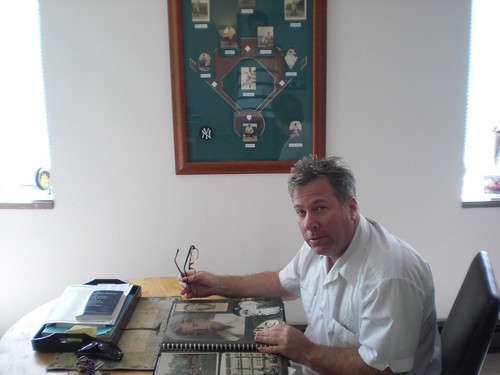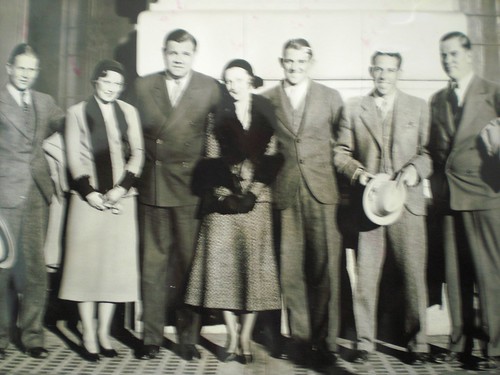Jeff Engels is writing a book.
Engels, who writes Jeff’s Mariners Fan Blog, is the grandson of former major leaguer Gordon “Dusty” Rhodes.
This isn’t the same Dusty Rhodes who pinch hit a home run in the 1954 World Series and wound up driving a bus in the World’s Fair in New York ten years later. But the story of the original Dusty Rhodes might be more heart wrenching.
I went to Seattle this past weekend for a wedding and visited Engels, a union worker by day, at his apartment in town. He showed me two scrapbooks and various framed photos of the grandfather he never met and who his family seldom spoke of.
Engels was two when Rhodes died in 1960 at 52 in Long Beach, California, decades removed from baseball and estranged from his family. In fact, his grandmother’s second husband forbade her to speak Rhodes’ name in his house, referring to him as “that old drunken ballplayer.”
Rhodes was supposed to be a star. Born in Winnemucca, Nevada in 1907, Rhodes grew up in Salt Lake City, playing baseball, football, and basketball and able to run a 10.2 in the 100 at West High. One of his school friends said years later, “Of all our crowd, Dusty had the most potential to do whatever he wanted in life, but he accomplished the least.”
While at University of Utah, Rhodes was scouted by Bill Essick, who brought Hall of Famers Joe DiMaggio, Lefty Gomez, and Joe Gordon to the New York Yankees. The Yankees purchased Rhodes for $15,000 on July 16, 1928, in the midst of his 17-10 campaign with a 3.26 ERA for the Hollywood Stars in the Pacific Coast League.
Rhodes arrived on a Yankee club in 1929 featuring Babe Ruth, Lou Gehrig, Tony Lazzeri, and Bill Dickey. Rhodes’ daughter Suzanne Engels began researching the book on him years ago, and in 1985, she wrote to Dickey. The Hall of Fame catcher and Rhodes’ battery mate sent a one-page, handwritten reply. Dickey began, “When Dusty first reported to the Yankees you could easily tell he was going to stick around awhile.”
Richard Beverage noted in his book Hollywood Stars that the Yankees sent Rhodes back to the Stars in 1930 for further development, and he sustained an arm injury that “haunted him for the rest of his career, and he never became the great pitcher everyone expected him to be.”
His best year as a Yankee, on and off the field, may have been 1931. Rhodes went 6-3 in 18 appearances with a 3.41 ERA, the only season in the majors his ERA was under 4.00. He married Leah Riser that same year, and Babe Ruth attended the nuptials. Here’s a wedding photo, the bride standing center between Ruth and Rhodes:
The Yankees traded Rhodes to the Boston Red Sox in August 1932 (his Yankee teammates voted him a $1,000 World Series share a few months later.) In a 1933 newspaper story, presumably ghostwritten, Babe Ruth called Rhodes, “the prize hard luck pitcher of the league.” Ruth was referencing several early-season outings for his former teammate though Rhodes didn’t have great luck in where he played after New York, either.
Rhodes was on the Red Sox just before owner Tom Yawkey made them contenders again, with Rhodes going 12-15 for a 63-86 club in 1933 and 12-12 for a 76-76 team the following year. Rhodes dipped to 2-10 with a 5.41 ERA in 1935 and was traded to the Philadelphia Athletics that December as part of a package for Jimmie Foxx.
A May 14, 1936 news clipping noted, “Rhodes recently paid (A’s manager Connie) Mack the compliment of saying that this was the first time in the majors that he has had a free mind, for he felt that Connie would give him every opportunity to make good.”
It was his final season in the show, a 9-20 campaign with a 5.74 ERA for the A’s, who lost 100 games and came in last. Rhodes finished with a 43-74 lifetime record and played in the minors until 1939.
Drinking may have contributed to Rhodes’ shortcomings. Beverage told me Rhodes “had a reputation as a very heavy drinker.” Pacific Coast League historian Mark MacRae, who sold memorabilia to Rhodes’ family, said alcohol affected many players in the era. “It was the drug of choice, and it was readily available at every stop along the way,” MacRae said.
Less is known about Rhodes’ life after baseball. Engels thinks his grandparents divorced while Rhodes was still playing. Rhodes married twice more and also served in World War II, earning a Bronze Star. At some point late in his life, Suzanne Engels spotted her father on a bus in Long Beach, though he refused to look at her, presumably out of pride. Rhodes was working in a hotel and broke when he died.
He hasn’t been forgotten. He was inducted into the Utah Sports Hall of Fame in 1982, and his daughter Suzanne Engels began researching the book around this time. After Suzanne Engels died on Labor Day 2008, her son Jeff took up the project, joining the Society for American Baseball Research last year. He’d love to talk to anyone who saw Rhodes play.
A ballplayer himself, still active in softball at 52, Engels missed knowing his grandfather.
“It was a hole, and that’s part of the reason I’m doing this research and writing,” Engels said. “Because I never got to just see him or hear him. Because I know how at the end me and my mom clicked, and we are the same sort, and we have the same perspective. And I believe that kind of came from him, that way of looking at things. So we were one and the same.”


Yes, the last name spelling is a bit different, but original “Dusty” Rhoads (Robert Barton Rhoads) made his major league debut in 1902 with the Cubs.
Hi Mark, thanks for commenting. I think Jeff may have mentioned Rhoads in the interview. He also said lots of people were nicknamed Dusty back then.
Hello Jeff,
I happened across your grandfather’s name while researching another notable ball player, “Wheezer” Dell. Wheezer was the first Nevada native to make it to the major leagues; he played for St. Louis and Brooklyn (as well as many years in the minors before and after the bigs) and your grandfather was the second.
My curiosity compels me to ask if you know more about the way he migrated from the U of Utah to the Hollywood Stars? Wheezer played for the Vernon Tigers, predecessors to the Stars, in the early 1920s and I am interested as the careers of these two Nevada boys — ex-Nevadans really (Wheezer grew up in Butte Montana) — and how their orbits may have intersected.
Thank you,
David Toll
775-847-0222
My husband and I had the privilege to take care of Leah, when she was staying at a place in Utah.. She had the same picture in her memory box, and would tell everyone the story of that beautiful day, . She was such beautiful ,elegant and loving woman, I was there when she passed attended her funeral. We still talk about one story I remember is about a Red Dress she wore to one of Dusty games. He got everyone in dugout singing lady in red. Her stories where amazing.
Hi, Just read your remarks about my Grandmother Leah and her baseball life with my Grandfather Gordon ” Dusty’ Rhodes. Would love to talk sometime either via email at : g-landauer@msn.com or give me a call at 206-331-2134….Thanks Jeff Engels
Jeff, My great aunt Thelma Addie Barton, Derry, Marvill married Dusty on 21 November 1942 in Wayne County MI. (Do not know how they met). Thelma had no children. Was a stenographer in Detroit.
They divorced ca 1945 (at the end of WWIi) haven’t found the divorce record.
As a family we did not hear much about Dusty from her except that he was a pro ball player.
Aunt Thelma died of cirrhosis of liver, an alcoholic. T was born 01 Nov 1906 in Lafayette township, Gratiot county MI, to Chester Hamilton BARTON and Anna Gertrude SHANk ,a farmers daughter. Died 09 May 1964 in Gratiot county Michigan.
Would love to know if u have any more info about Thelma and Dusty.
Renee Smith
Genealogy nerd